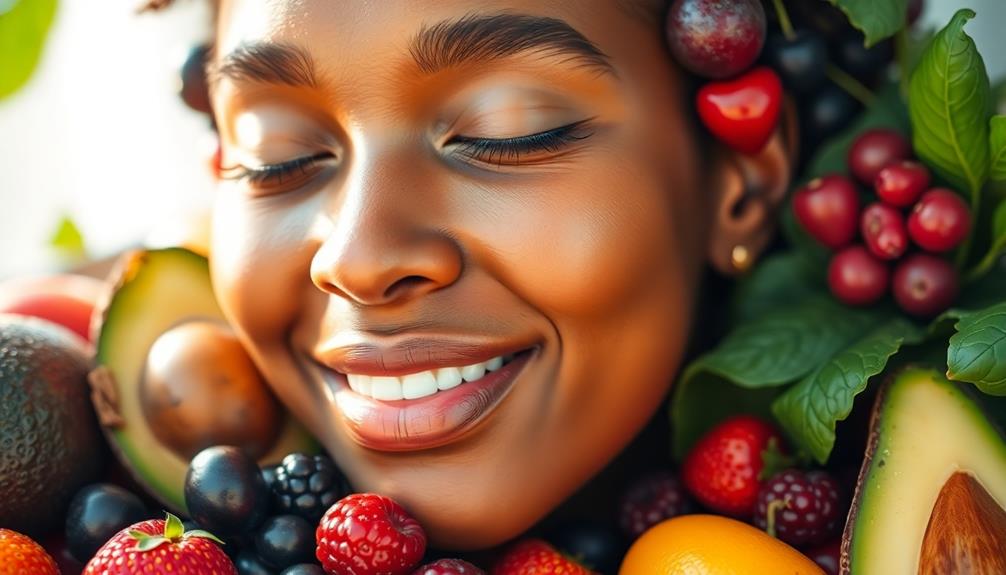Your eating habits greatly impact your skin's health and appearance. Diets high in sugar and processed foods can trigger inflammation and increase acne risk. Instead, focus on nutrient-rich foods filled with vitamins and antioxidants, like colorful fruits and fatty fish, which can enhance hydration and reduce inflammation. Omega-3 fatty acids, zinc, and vitamin E are particularly beneficial for skin repair and protection. Staying properly hydrated also helps maintain moisture and elasticity. Want to know which specific foods to include or avoid for the best results? There's more insight just around the corner.
Key Takeaways
- High sugar and processed foods increase inflammation and can exacerbate acne, negatively impacting skin health and appearance.
- Nutrient-rich foods, especially those high in vitamins and antioxidants, support skin repair and combat oxidative stress.
- Omega-3 fatty acids from fatty fish enhance skin hydration and reduce inflammation, promoting a healthier complexion.
- Hydration from water and hydrating foods is crucial for maintaining skin moisture and elasticity, influencing overall appearance.
- Fermented foods contribute to gut health, which may reduce acne incidents, reflecting the link between diet and skin conditions.
Impact of Diet on Skin Health
Your diet plays a significant role in the health and appearance of your skin. Consuming a diet high in sugar and processed foods can lead to increased inflammation and a higher likelihood of developing acne. In fact, studies show that individuals with high-fat, high-sugar diets have a 54% increased chance of experiencing acne.
Incorporating nutrient-rich meals, such as Mushroom Masala or other vegetarian options, can help provide necessary vitamins and minerals that promote healthy skin. To improve your skin health, focus on incorporating antioxidant-rich foods like fruits and vegetables into your meals. These foods help combat oxidative stress, promoting skin repair and preventing premature aging.
Additionally, necessary nutrients like omega-3 fatty acids, zinc, and vitamins C and E are essential for maintaining your skin's health. They support hydration, collagen production, and reduce inflammation, all of which contribute to a glowing complexion.
Don't forget the importance of staying hydrated; drinking enough water and eating hydrating foods, such as cucumbers and watermelon, can greatly enhance your skin's moisture and elasticity.
Key Nutrients for Healthy Skin
A variety of key nutrients are essential for maintaining healthy skin and achieving a radiant complexion. First up is vitamin C, which plays a significant role in collagen production and skin repair. Without enough vitamin C, you might notice dryness and wrinkles becoming more prominent.
Additionally, incorporating foods rich in collagen, such as Red-Braised Pork Belly, can further support skin health. Next, omega-3 fatty acids, commonly found in fatty fish, help reduce inflammation and enhance skin hydration, leading to a more vibrant appearance.
Zinc is another important nutrient that supports healing and can be a game changer for acne prevention. A deficiency in zinc might result in delayed wound healing and increased acne lesions, so make sure you're getting enough.
Don't forget about vitamin E, which protects your skin from oxidative damage caused by UV exposure. Antioxidants from fruits and vegetables also combat free radicals, helping to slow down the aging process.
Lastly, a balanced intake of protein is essential for maintaining skin elasticity and structure since it supports collagen and elastin production. By incorporating these key nutrients into your diet, you'll set the foundation for healthy, youthful skin.
Beneficial Foods for Skin Health
Several foods can greatly enhance your skin health and contribute to a radiant complexion. Incorporating beneficial foods into your healthy diet can help improve hydration, reduce inflammation, and promote overall skin well-being. Here's a quick look at some of the top foods to take into account:
| Food Category | Benefits |
|---|---|
| Fatty Fish | Rich in omega-3s, reduces inflammation |
| Colorful Fruits | High in antioxidants, combats oxidative stress |
| Nuts and Seeds | Provide vitamin E, protect against UV damage |
| Whole Grains | Support stable blood sugar, boost skin cell production |
| Fermented Foods | Improve gut health, reduce acne incidents |
Eating fatty fish like salmon provides essential omega-3 fatty acids, which help improve skin hydration and elasticity. Adding a variety of colorful fruits and vegetables, such as berries and leafy greens, boosts your antioxidant intake. Nuts and seeds, particularly almonds, contribute to hydration and UV protection. Whole grains maintain stable blood sugar levels, supporting skin cell production. Finally, fermented foods like yogurt enhance gut health, leading to better skin appearance. Incorporate these beneficial foods for ideal skin health!
Harmful Foods for Skin Health
Incorporating beneficial foods into your diet can greatly improve skin health, but it's equally important to be aware of harmful foods that can detract from your efforts. High-fat and high-sugar foods are among the most detrimental, as they can worsen acne severity and trigger inflammation, increasing the likelihood of acne breakouts by 54%.
Including fresh ingredients like Chilaquiles or grilled vegetables can provide the nutrients needed for healthier skin. You should also take a close look at your dairy intake; for some individuals, dairy products may cause hormonal fluctuations that exacerbate acne.
Processed foods are another category to watch out for. They often lack essential nutrients and can lead to inflammation, negatively impacting your skin's quality and appearance. Additionally, foods with a high glycemic index, like sugary snacks and refined carbs, can cause insulin spikes, further contributing to those pesky acne breakouts.
Don't forget about alcohol, either. While it might seem harmless, alcohol can dehydrate your skin and worsen conditions like rosacea, leading to increased redness and inflammation.
Lifestyle Factors Influencing Skin Health
Maintaining healthy skin goes beyond just diet; lifestyle factors play an essential role in your skin's appearance and overall health. Proper hydration is necessary; when you're dehydrated, your skin loses moisture and elasticity, leading to dryness and potential issues. Incorporating nutrient-rich foods, such as those found in farm-to-table cooking, can also provide your skin with important vitamins and minerals. For example, dishes like Nettle and Potato Soup can boost your vitamin intake, improving skin health.
Make sure you drink enough water throughout the day to keep your skin looking its best.
Managing stress is equally important. High stress levels can trigger skin problems like eczema and psoriasis, so finding ways to relax is significant for maintaining a vibrant complexion.
Don't underestimate the power of quality sleep, either. Sleep deprivation can leave your skin looking dull and can exacerbate existing skin conditions. Aim for 7-9 hours of restful shut-eye each night.
Regular physical activity enhances circulation, delivering oxygen and nutrients to your skin cells, which promotes a healthier appearance. Additionally, when you're out in the sun, always apply sunscreen to protect against UV damage, which can accelerate skin aging and increase the risk of skin conditions.
Frequently Asked Questions
How Do Eating Habits Affect Your Skin?
Your eating habits play an essential role in your skin's health. If you indulge in sugary or processed foods, you might notice breakouts. A balanced diet filled with nutrients can enhance your complexion and overall appearance.
How the Food You Eat Affects Your Appearance?
The food you eat shapes your appearance markedly. Nutrient-rich meals boost your glow, while sugary, processed options can lead to issues. You've got the power to enhance your look through mindful dietary choices.
Does Eating Healthy Make Your Skin Look Better?
Eating healthy can transform your skin like a magic potion! When you nourish your body with vibrant fruits and veggies, you're boosting your complexion and radiance. You'll notice a remarkable glow that turns heads everywhere!
What Is the Relationship Between Nutrition and Skin Health?
Nutrition directly influences your skin health; what you eat affects hydration, elasticity, and appearance. A balanced intake of vitamins and antioxidants can enhance your complexion, while unhealthy choices might lead to breakouts and premature aging.
Conclusion
Incorporating healthy eating habits into your daily routine can transform your skin into a radiant canvas. Think of your skin as a reflection of your inner health; when you nourish your body with the right foods, you're giving it the love it deserves. By choosing beneficial nutrients and avoiding harmful ones, you can reveal the secret to vibrant, glowing skin. Remember, every meal is a brushstroke in the masterpiece of your appearance—make it count!










